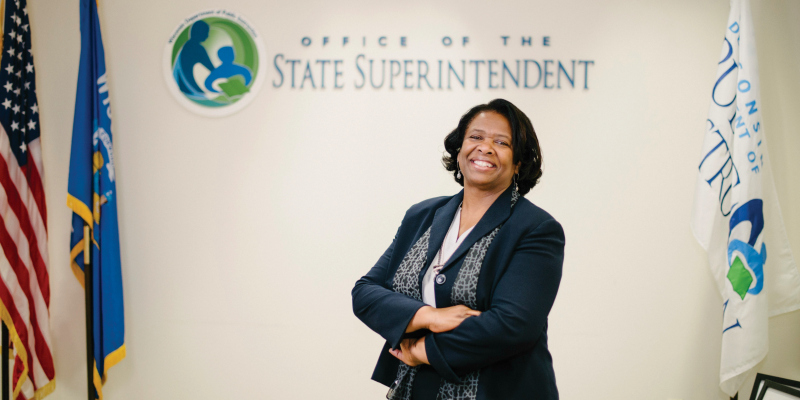By Emily McCluhan | Photographed by Hillary Schave
Carolyn Stanford Taylor is quick to smile and laugh, immediately creating a sense of welcome and ease. But it’s the calm strength of her voice as she tells the story of being one of the first black students to integrate the schools in her rural Mississippi hometown that hints at her leadership. And it reflects why she was appointed as the Wisconsin Superintendent of Public Instruction in January this year, the first African American in that role.
After the Civil Rights Act of 1964 passed, Stanford Taylor’s mother gave her and four of her 13 siblings the choice to stay at their school in Marks, Mississippi, or cross the railroad tracks and enroll in the school where all the students were white, and there were manicured lawns, new books, athletic equipment and most importantly, the only pool in town. She and her siblings didn’t hesitate: they chose the pool.
The Stanford kids expected the name calling and bullying from the other students at their new school, but they were not prepared for the treatment the teachers threw at them.
“The adults in the school did not want us there either, and they made us feel that every day,” Stanford Taylor recalls. “Kids who had as much potential as I had were beat down by that system, the system that told them that they weren’t worthy. That they weren’t entitled to be there.”
Stanford Taylor’s mother refused to allow her children to be punished unfairly and became an advocate for her kids while teaching them to speak up against this inequity. Stanford Taylor notes that other black students didn’t have this advocate at home and ended up dropping out. She credits her current passion to create equity to her childhood experiences of seeing her peers failed by the system.
In the 1970s, the engineering program at UW-Madison actively recruited students of color from the South, which is how Stanford Taylor’s brother ended up here. Although she received a scholarship to attend Mississippi Valley State University, Stanford Taylor decided to follow her brother to Madison in the winter of 1975 to pursue a degree in elementary education.
She describes her journey as ordered, but not planned.
“It’s always been about somebody getting ready to move on from a role and seeing my potential to lead, and saying, yes, you can do this,” she says.
Stanford Taylor taught elementary and middle school in the Madison Metropolitan School District for a number of years, eventually earning a master’s degree and certifications to move into administration.
She jumped at the opportunity in the early 1980s to become principal at Marquette Elementary, which gave her exposure to a newly “paired” school where she led grades three through five (kindergarten through second grades moved to Lapham Elementary). Soon after, she became principal at Lincoln Elementary, which was paired with Midvale Elementary. The mission of these paired schools resonated with her.
“If we had not had the pair, Lincoln might have been 98% kids of color since it’s on the south side of Madison,” she says. “It was a goal to keep those schools desegregated because of where they are located.”
During this time, Stanford Taylor met Margaret Planner, a principal at Thoreau Elementary. They built a professional and personal friendship exchanging ideas and learning from each other. Planner says that Stanford Taylor’s patience and ability to actively listen made it easy to ask questions and learn about communities of color and backgrounds different from her own.
“As a colleague she was so inspirational because she is so bright,” says Planner. “But along with that comes the fact that she is kind and has this ability to bring people together around shared goals. That’s probably what has inspired me the most— how she approaches every situation with kindness.”
Planner and Stanford Taylor were both selected to join State Superintendent Elizabeth Burmaster at the Department of Public Instruction in 2001, with Planner as the assistant superintendent over student achievement and Stanford Taylor over learning support for equity and advocacy.
“When I got the call from Libby [Burmaster], I didn’t even have that on my radar,” Stanford Taylor says. “But after the conversation, I thought this might be the next way to influence what happens for all kids. At a different level—a policy level.”
After 17 years as assistant superintendent with DPI, Stanford Taylor felt she had found the place she could make the most impact and hopes that she helped change the perception of the agency’s role.
“I hope that we’re not seen so much as the monitoring and compliance police,” she says. “We want districts to understand that we are truly interested in helping them because the better they do the better our children do. It’s not about the gotcha…let’s talk about challenges and barriers to them being successful with all populations of kids.”
This legacy made it easier for her to accept Gov. Tony Evers’ appointment as the new state superintendent after Evers was elected governor in 2018.
“I felt like the time was right. That all of the work that I’ve done in my previous years had led me here and equipped me to take this job,” she says.
Stanford Taylor’s influence has not only touched students and school communities, but it also had a big impact on her daughter, Carlettra Stanford.
“I did not have a desire to go into education. I witnessed firsthand the hard work and long hours and was adamant that I would not be a teacher,” says Stanford with a laugh.
Instead she pursued a psychology and pre-medicine degree at Spelman College in Georgia but found herself drawn back to working with youth at every turn. She eventually moved to education and has worked for MMSD for 23 years as a teacher, principal, and now as the chief of schools—elementary. Stanford says her mother was an advocate for her and taught her to speak up, just like Stanford Taylor’s mother did for her.
“My mother was not only my No. 1 advocate, but she taught me how to advocate for myself and others as well,” says Stanford. “She taught me to not just notice what was wrong, or needed to be changed, but to figure out how I could facilitate that change.”
Stanford Taylor pushes that same message of advocacy and community in all areas of her life, across her large family, to her deep involvement with her church, to speaking opportunities with groups of our future leaders.
She recently had a chance to interact with Badger Girls State, a weeklong government and leadership conference for young women in their junior year of high school. When the African American girl who had been elected governor for the week approached Stanford Taylor to tearfully thank her for being there, Stanford Taylor realized the impact she has in her new role.
“I started to understand that it wasn’t just about being superintendent, but about bringing a message of hope and what the world could look like,” she says. “That’s what I told them. You are our future leaders, you all will be the ones to turn things around, to create a better world. And they will.”
Stanford Taylor says she feels honored to be state superintendent and knows that she represents more than just herself and her experience. When she thinks about what success will look like through her tenure, she sees all students walking into a school environment feeling safe, respected and taking ownership in their school. She’s optimistic that the groundwork is laid at DPI to build school communities that thrive on the equity and opportunity she missed as a young girl in Mississippi. And she’s already creating that change.




